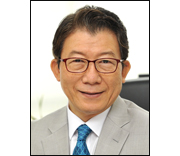-
[April 19. 2017 Korea times] Spotlighting road to ROK's prosperity
- Date : 2017.05.08
- Views : 393
Spotlighting road to ROK's prosperity

By Jeffrey I. Kim
Friedrich Hayek’s book, “The Road to Serfdom” was published in 1944 and became a bestseller. In that book he argues that the abandonment of individualism and classical liberalism inevitably leads to a loss of freedom, the creation of an oppressive society, the tyranny of a dictator and the serfdom of the individual. He strongly believes that government intervention in markets leads to a loss of individual freedom. Furthermore, he admits a limited role for government to perform tasks of which free markets are not capable of.
In April 1947, Hayek and Milton Friedman organized the Mont Pelerin Society (MPS). The founding members of the Society were 39 world-renowned scholars. The aims of the MPS were: (1) to facilitate an exchange of ideas between like-minded scholars; (2) to strengthen the principles and practice of a free society; and (3) to study the workings, virtues, and defects of a market-oriented economic system. The MPS has produced nine Nobel Prize winners. They are Friedrich Hayek, Milton Friedman, George Stigler, James Buchanan, Maurice Allais, Ronald Coase, Gary Becker, Vernon Smith and Mario Vargas Llosa.
The society has continued to meet regularly, the General Meeting every two years and the regional meetings annually. At times the society holds special meetings. In September 2014, the board members of the MPS unanimously voted for Korea’s hosting of the 2017 MPS Regional meeting in Seoul during May 7-10.
The hosting of an MPS meeting in Korea is long overdue. Economic power countries in Asia have all hosted the MPS meetings except the Republic of Korea. Japan hosted the conference twice in 1988 and 2008. Hong Kong organized meetings twice in 1978 and 2014. Even Taiwan hosted the meeting two times in 1978 and 1988. Hosting an MPS conference requires two to three years of preparatory work. Inviting the speakers, deciding the venue, and funding the expenses are all challenging work.
Currently there are more than 600 MPS members. This time, about 300 will participate in the Seoul Conference. Among them are two Nobel Laureates, Prof. Peter Hansen of the University of Chicago and Prof. Vernon Smith of Chapman University. Many of them have long admired Korea’s economic success. They are coming to Seoul with great excitement to see the remarkable progress Korea has made.
The theme of the MPS Seoul Meeting is “Economic Freedom: The Road to Prosperity.” The speakers are bringing with them special messages to the Korean people. Their messages feature such issues as income inequality, entrepreneurs’ innovation, productivity and employment, central banking in times of change and financial stability, welfare and taxation, and security on the Korean peninsula.
In the plenary sessions, the speakers and panelist will discuss various issues including the conceptual relationship between political inequality and income inequality. They argue that economic inequality per se is neither good nor bad and that if the government aims at more political equality, it will raise economic inequality.
Another issue that will catch the attention of the audience is the adoption of a new macroeconomic indicator, GO (Gross Output) or GDE (Gross Domestic Expenditure). The idea is to remedy the weakness of the conventional GDP (Gross Domestic Product) indicator which fails to measure entire business activities within a specified period. They argue that supporting business activities rather than household consumption would be a lot more effective in expanding jobs. They will specifically demonstrate how to construct a new times series for Go or GDE.
They will also provide new thoughts and guides in central banking. They emphasize the fundamental principles of central banking. They believe both price and financial stability are the key objectives of the central bank. The maintenance of such stability is the precondition for the attainment of sustainable growth.
The 2017 MPS Seoul Conference overlaps with Korea’s presidential election. The participants understand that Korea is now at a crossroads. Depending on the result of the presidential election on May 9, the Korean economy may continue steady growth or unstably jump up and down under political uncertainties. Whoever becomes the next president, the MPS participants hope Korea will continue to prosper economically and they will try their best to help us. We hope that the MPS Seoul meetings will shed light on the road to Korea’s continued prosperity.
http://www.koreatimes.co.kr/www/news/opinon/2017/04/198_227775.html










